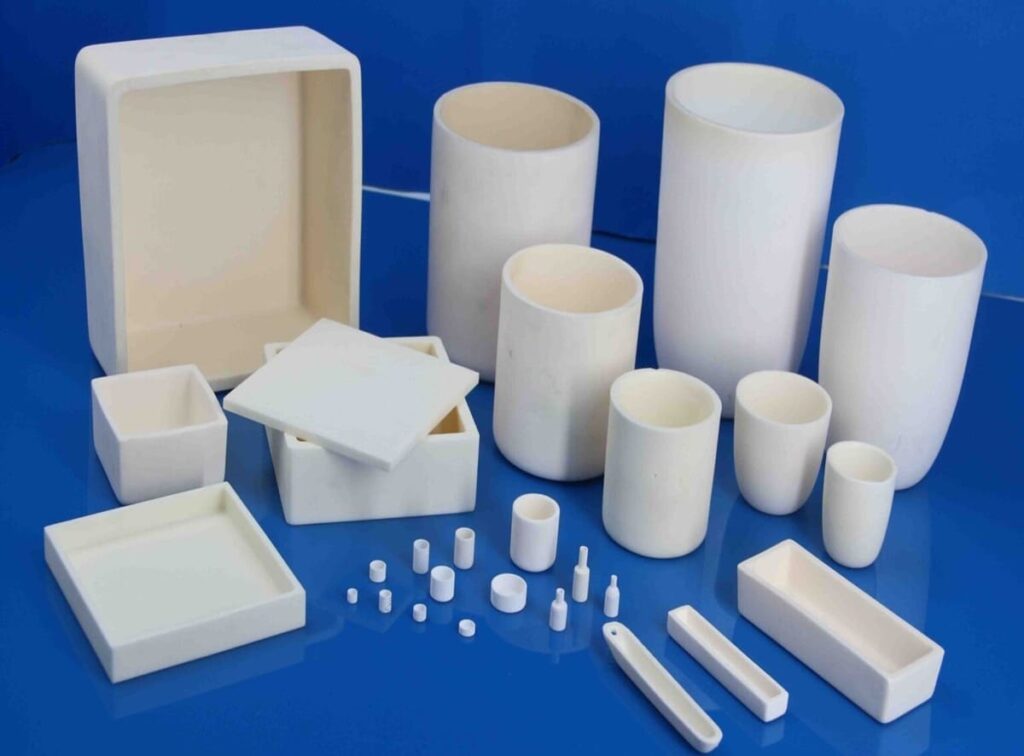Cerámicas de alúmina: Propiedades para aplicaciones de ingeniería
Introducción
Las cerámicas de alúmina (Al₂O₃), u óxido de aluminio, son materiales no metálicos avanzados conocidos por su resistencia mecánica, estabilidad térmica y aislamiento eléctrico. Disponibles en purezas de 95%, 97,5%, 99% y 99,5% Al₂O₃, estas cerámicas son ideales para aplicaciones de ingeniería en electrónica, sistemas mecánicos y gestión térmica. Este artículo detalla las propiedades clave de las cerámicas de alúmina, con el apoyo de una tabla comparativa, para destacar su idoneidad para soluciones de ingeniería.
Propiedades de la cerámica de alúmina
Las cerámicas de alúmina ofrecen una serie de propiedades mecánicas, térmicas, eléctricas y químicas que las hacen idóneas para aplicaciones de ingeniería exigentes. A continuación se describen sus principales características:
- Alta dureza: La dureza Vickers oscila entre 13,7 GPa (95% Al₂O₃) y 17,5 GPa (99,5% Al₂O₃), ideal para componentes resistentes al desgaste.
- Resistencia mecánica: Resistencia a la flexión de 310 MPa (97,5% Al₂O₃) a 400 MPa (99,5% Al₂O₃), adecuada para aplicaciones de carga.
- Conductividad térmica: Oscila entre 24 W/(m-K) (95% Al₂O₃) y 34 W/(m-K) (99,5% Al₂O₃), lo que favorece la disipación del calor.
- Aislamiento eléctrico: Resistividad volumétrica >10¹⁴ ohm-cm en todas las calidades, lo que garantiza la fiabilidad de los sistemas electrónicos.
- Resistencia a la corrosión: Pérdida de peso mínima en ácidos (por ejemplo, 0,03 mg/cm²/día en HNO₃ para 99,5% Al₂O₃), perfecto para entornos duros.
Tabla detallada de propiedades
La tabla siguiente compara las propiedades de la cerámica de alúmina en los grados 95%, 97,5%, 99% y 99,5% Al₂O₃.
| Propiedad | 95% Al₂O₃ | 97.5% Al₂O₃ | 99% Al₂O₃ | 99,5% Al₂O₃ |
| Características principales | ||||
| Color | Blanco | Blanco | Blanco | Blanco |
| Principales aplicaciones | Metalización, resistencia al desgaste | Gran resistencia al desgaste | Alta temperatura, resistencia al desgaste | Alta temperatura, resistencia al desgaste |
| Características | Alta resistencia, resistencia al desgaste, resistencia a la corrosión, aislamiento | Alta resistencia, resistencia a la corrosión | Alta resistencia, resistencia a la corrosión | Alta resistencia, resistencia a la corrosión |
| Propiedades mecánicas | ||||
| Densidad aparente (g/cm³) | 3.7 | 3.8 | 3.9 | 3.9 |
| Absorción de agua (%) | 0 | 0 | 0 | 0 |
| Dureza Vickers (GPa) | 13.7 | 15.2 | 17.2 | 17.5 |
| Resistencia a la flexión (MPa) | 350 | 310 | 380 | 400 |
| Resistencia a la compresión (MPa) | - | - | - | 3800 |
| Módulo de Young (GPa) | 320 | 360 | 380 | 380 |
| Relación de Poisson | 0.23 | 0.23 | 0.23 | 0.23 |
| Resistencia a la fractura (MPa m¹/²) | 3-4 | 5-6 | - | - |
| Propiedades térmicas | ||||
| Capacidad calorífica específica (J/(kg-K) × 10-³, 400°C) | 7.2 | 7.2 | 7.2 | 7.2 |
| Conductividad térmica (W/(m-K)) | 24 | 25 | 32 | 34 |
| Resistencia al choque térmico (ΔT°C) | 200 | 200 | 200 | 200 |
| Propiedades eléctricas | ||||
| Resistividad volumétrica (ohm-cm) | >10¹⁴ | >10¹⁴ | >10¹⁴ | >10¹⁴ |
| Rigidez dieléctrica (kV/mm) | 15 | 15 | 15 | 15 |
| Constante dieléctrica (1 MHz) | 9.4 | 9.9 | 9.9 | 9.9 |
| Pérdida dieléctrica (×10-⁴) | 38 | 20 | 10 | 10 |
| Propiedades químicas | ||||
| Ácido nítrico (60%) Pérdida de peso (mg/cm²/día) | 0.10 | 0.05 | 0.03 | 0.03 |
| Ácido sulfúrico (95%) Pérdida de peso (mg/cm²/día) | 0.33 | 0.22 | 0.19 | 0.19 |
| Sosa cáustica (30%) Pérdida de peso (mg/cm²/día) | 0.06 | 0.04 | 0.03 | 0.03 |
Notas de la tabla:
- Propiedades mecánicas: Los grados de mayor pureza (99% y 99,5% Al₂O₃) ofrecen una mayor dureza (17,2-17,5 GPa) y resistencia a la flexión (380-400 MPa).
- Propiedades térmicas: La conductividad térmica mejora con la pureza, de 24 W/(m-K) a 34 W/(m-K).
- Resistencia química: Una mayor pureza reduce la pérdida de peso en los ácidos, mejorando la resistencia a la corrosión.
Conclusión
Las cerámicas de alúmina ofrecen una excepcional resistencia mecánica, estabilidad térmica y aislamiento eléctrico, lo que las hace ideales para aplicaciones de ingeniería en electrónica, sistemas mecánicos y gestión térmica. La gama de purezas permite soluciones a medida en entornos exigentes.
Centro de cerámica avanzada es uno de los principales fabricantes y proveedores de cerámica de alúmina productos en forma de placas, láminas, varillas, tubos, crisoles, sustratos y piezas a medida, ofreciendo soluciones personalizadas para diversas aplicaciones industriales y de investigación.

